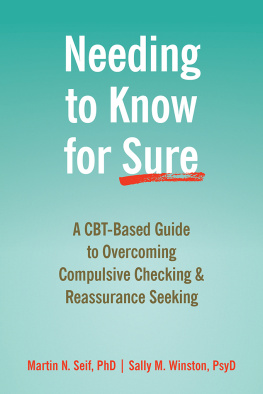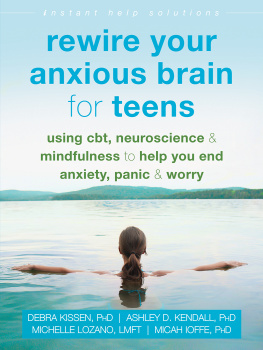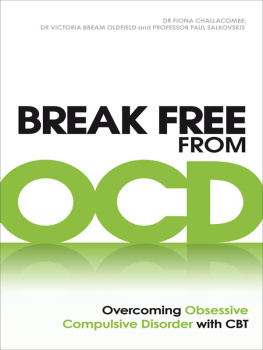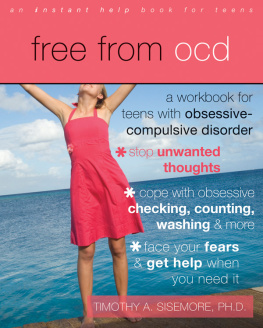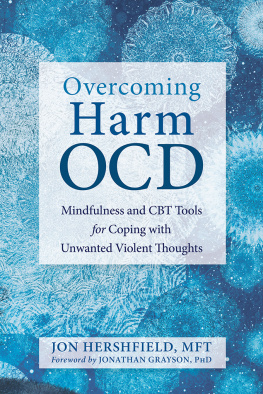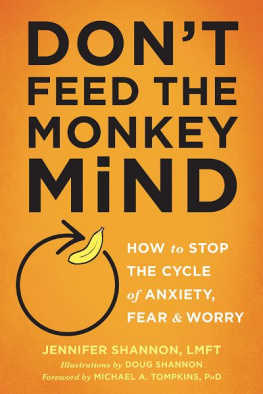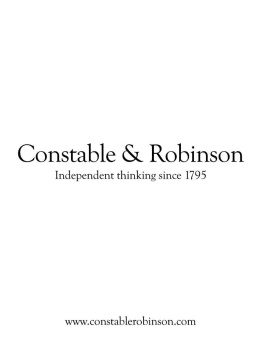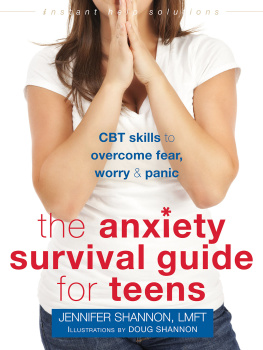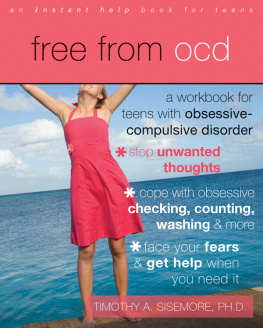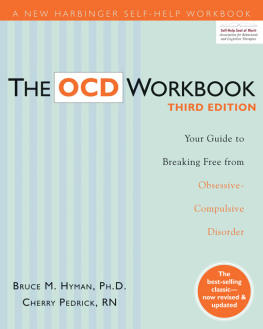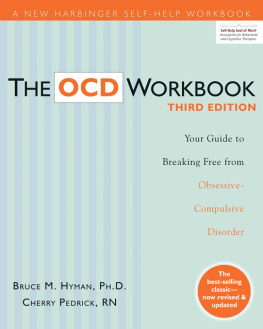I was blown away when I read this book. It perfectly describes my anxiety-reddened patients who are so consumed with doubt and uncertainty, that they need constant reassurance to live their life. If you are filled with doubt; cant make a decision without input from others; are constantly checking and rechecking; or lie awake dwelling, planning, and reviewingrest assured, this is the perfect book for you.
Ken Goodman, LCSW , board member of the Anxiety and Depression Association of America, and president of www.quietmindsolutions.com
Repeated checking or asking for reassurance even when know that you locked the door, turned off the stove, or prepared adequately for that meeting or testoften accompanied by feelings that something bad will happen if you dontis incredibly common. But at its most severe, in the form of obsessive-compulsive disorder (OCD), it can be crippling. Now, Martin Seif and Sally Winston, two of the foremost experts in the world working in this area, provide a very helpful and easy to implement set of interventions to overcome these annoying and sometimes life-interfering problems. I would recommend this book to my patients and to some of my friends.
David H. Barlow, PhD, ABPP , professor emeritus in the departments of psychological and brain sciences, and psychiatry; and founder and director emeritus for the Center for Anxiety and Related Disorders at Boston University
Many times, the damage our own immune system does in response to a bodily signal is more destructive than the injury or antigen itself. So it is with the torment of doubt and uncertainty, and the rush to relief and reassurance. Seif and Winston have laid out the challenge and the solution to the self-inflicted torment of anxiety and distress about uncertain future threats. This volume will help people live.
Jerrold F. Rosenbaum, MD , chief of psychiatry at Massachusetts General Hospital, and Stanley Cobb Professor in the department of psychiatry at Harvard Medical School
For those of you who have found yourselves caught in the endless cycle of reassurance seeking, this book is for you. Needing to Know for Sure provides much-needed guidance to help you know the difference between reassurance seeking and information seeking by giving you great examples and helpful facts throughout the book. Most importantly, the authors offer step-by-step guidance to get you disentangled from reassurance seeking and back to living your life by increasing your ability to handle uncertainty. I am excited to share this book with my clients.
Kimberly Morrow, LCSW , anxiety therapist, author, national speaker, and co-owner of www.anxietytraining.com
Needing to Know for Sure is a terrific resource for anyone who wants to understand how futile attempts to eliminate uncertainty in life are at the core of any obsession. The authors clear expertise in OCD and anxiety is reflected in their believable examples of people trapped in the need to know. The book offers a great variety of tips and tools for abandoning unproductive reassurance and learning that life really is better with doubt.
Jon Hershfield, MFT , author of Overcoming Harm OCD , and director of The OCD and Anxiety Center of Greater Baltimore
Seif and Winston have a talent for identifying and explaining commonly misunderstood aspects of human anxiety. Their last book explores the nature of unwanted intrusive thoughts, and offers useful concepts and tools to disempower and transcend the thoughts. In Needing to Know for Sure , the authors turn their attention to the various ways in which people try to cope with anxious uncertainty. We learn that, in the face of a threat, attempting to feel safe by resolving doubt is a natural human response. After all, who hasnt double-checked to ensure their door is locked, or asked their physician for reassurance about a medical condition? But we also learn that, for some individuals, uncertainty can become intolerable and disabling. Fortunately, the authors provide a new, more effective approach to the problem. I highly recommend this book to anyone struggling anxiously to know for sure, and to loved ones and health care professionals attempting to assist them.
C. Alec Pollard, PhD , professor emeritus of family and community medicine at Saint Louis University School of Medicine, and director of the Center for OCD and Anxiety-Related Disorders at Saint Louis Behavioral Medicine Institute
If youve ever become paralyzed by worries like Am I crazy? or Will my kids be ok? then this book is for you. If you have OCD, it will help you stop trying to replace your negative thoughts with positive ones. This book will free you to accept all your thoughts, and give up the pursuit of certainty. The authors clearly explain the value of surrender, allowing worry without being dominated by it. If you care about someone with OCD, this book will show you how to stop offering unproductive reassurance and help this person embrace a challenging life.
David L. Kupfer, PhD , clinical psychologist with a private practice in Falls Church, VA, with forty years of experience treating OCD
I love this book! Its the only book specifically on reassurance, and it explains in great detail the categories of fears that keep reassurance going. If you compulsively seek reassurance, after reading this book, you may feel understood and empowered in ways that you havent previously felt. It offers helpful clarifications about unproductive reassurance seeking, unhelpful self-talk, and common categories of reassurance traps. The books examples make the concepts easy to apply in your own life. With their combined seventy-plus years experience, Sally and Martys style is deeply compassionate and deeply knowledgeable.
Maggie Perry, PsyD , licensed psychologist, and founder of www.huddle.care
Can you answer yes to any of the following six questions? Do you spend a lot of time and effort checking things and seeking reassurance? Do you need to know for sure about areas or issues in your life? Do you constantly check your phone, email, or the internet? Do you keep checking locks, alarms, or appliances? Do you have endless internal debates with no resolution? Do you repeatedly ask others for reassurance? If you answered yes to one or more of these questions, this book can be a huge shortcut to lifting the burden of anxiety and distress.
Neal Sideman , self-help advocate, internationally known coach and teacher for people recovering from anxiety disorders, member of the Anxiety and Depression Association of America (ADAA), and cochair of the ADAA Public Education Committee
Uncertainty is at the heart of treating many anxiety disorders, and is especially relevant when treating OCD. Martin Seif and Sally Winston have written an excellent book that addresses this theme common to so many of the anxiety disorders. In clear and straightforward language, the authors lay out how our unwillingness to accept uncertainty creates anxiety, and offer a variety of very helpful suggestions for surrendering to and simply accepting that uncertainty is part of living. This is a book that I am certain to recommend to many of my clients for years to come.
Robert W. McLellarn, PhD , founder and director of the Anxiety and Panic Treatment Center, LLC in Portland, OR
Filled with examples and step-by-step instructions, Seif and Wilson have written a book that I will highly recommend to my clients. Needing to Know for Sure clearly explains how to learn to give up on relying on compulsive checking and reassurance seeking, and embrace the beautiful uncertainty of life.
Elizabeth DuPont Spencer, LCSW-C , clinician, trainer, supervisor, and coauthor of CBT for Anxiety
In this book, Martin Seif and Sally Winston explain how intolerance of uncertainty and reassurance seeking are major contributors to anxiety and other negative emotional states. They offer an innovative and easily understood perspective on the relation between intolerance of uncertainty and excessive reassurance seeking that has immediate clinical application. Using numerous case illustrations, diagrams, and plain language interpretation of the latest scientific evidence, Seif and Winston provide guidance in self-identifying, destructive forms of reassurance seeking. Later chapters offer detailed instruction on how mindfulness, distress tolerance, and exposure to uncertainty are effective in breaking the ties between reassurance seeking and anxiety. This is essential reading for anyone who has struggled with anxiety or found conventional treatment approaches unsatisfactory. You will walk away from this book with a new understanding of anxiety and fresh ideas for its treatment.

